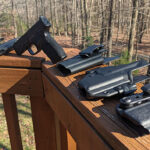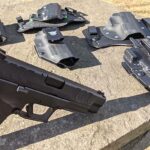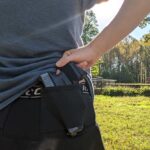We’ve all been there. You’ve got a new gun and you can’t wait to run some rounds through it at the local range. But can you shoot a new gun straight out of the box? It is possible to shoot a gun straight out of the box, but you are more likely to experience a malfunction. Therefore, the better option is to field strip the firearm, remove the packing grease, and lubricate for the range.
Field Strip Your Firearm Before Shooting
Before I put any rounds through a new gun, I want to know exactly how the firearm operates. There are two reasons that I do this. First, I will field strip the firearm to ensure that I understand how it operates in case of a malfunction.
I want to know what the potential sources of a malfunction might be, and ensure that I can clear a malfunction with standard methods. If I am concerned about something I will load up dummy rounds to test things out.
Another reason to field strip the firearm is to spot any inconsistencies in the operation of the gun. Before I shoot a gun straight out of the box, I will check all the moving parts. Does the slide catch or rub and impede movement? Does the magazine stick or need assistance with ejection? How about the trigger?
Knowing where problems are likely to occur can also assist with lubrication, which i’ll cover next.
Remove The Grease & Lubricate Before Shooting

During the process of field stripping the firearm, I will perform a thorough cleaning and lubrication. There are several reasons, 5 to be exact, I clean off the grease before shooting a gun straight out of the box.
First, I am not partial to grease as a lubricant because I’ve had problems with excessive grease clumps resulting in gun malfunctions. Additionally, the grease will combine with byproducts, such as carbon, to create a really nasty concoction.
Second, the grease used on new firearms is meant for storage and shipping. Therefore, there is often an excess amount of grease on a gun straight out of the box. Remember, that most firearms are not made to order and can sit on a shelf or at a store for an unknown amount of time.
Third, I don’t know what the properties of the grease are and therefore cannot predict if there will be any adverse effects to my new gun. Here’s a quick article about how different gun grease can be from one type to the next.
Fourth, excessive amounts of lubricant can hide or disguise potential problems with the firearm (see the above section). Sometimes there’s nothing you can do, because most firearm sales are final. However, I prefer to avoid dangerous situations and won’t fire a gun straight out of the box until know it can perform each step in the cycle of operation safely.
Finally, I know that by removing the factory grease I must lubricate the gun to the manufacturers recommendations. Additionally, I know the properties of the oil I plan to use and presumably have used it on other firearms.
Parting Shots
I think that about sums up why you should not fire a gun straight out of the box. Instead take the time to inspect your firearm for proper function and set it up for a successful trip to the range. Remember that some firearms require a break-in period and I want to minimize the risk of a malfunction during that time. Hopefully you’ve found this article helpful and will consider sharing it with your network.









